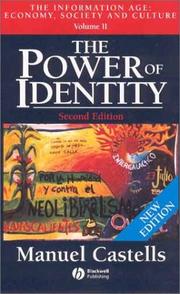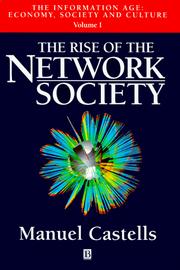| Listing 1 - 10 of 12 | << page >> |
Sort by
|

ISBN: 1405107138 Year: 2004 Publisher: Oxford Blackwell
Abstract | Keywords | Export | Availability | Bookmark
 Loading...
Loading...Choose an application
- Reference Manager
- EndNote
- RefWorks (Direct export to RefWorks)
Sociology of knowledge --- Computer. Automation --- Sociology of culture --- maatschappijleer --- cultuursociologie --- Social change --- Information society --- Social movements. --- Information technology --- -Information technology --- -Identity --- #SBIB:309H1720 --- 316.32 --- 316.323.9 --- Identity --- Philosophy --- Comparison (Philosophy) --- Resemblance (Philosophy) --- IT (Information technology) --- Technology --- Telematics --- Information superhighway --- Knowledge management --- Movements, Social --- Social history --- Social psychology --- Sociology --- Social aspects --- Political aspects --- Informatiekunde, informatie management --- Globale samenlevingsvormen --- Postmoderne maatschappij. Sociologie van het postmodernisme --- Identity (Philosophical concept) --- Information society. --- Sociale verandering --- Political aspects. --- Social aspects. --- Identity (Philosophical concept). --- Sociale verandering. --- 316.323.9 Postmoderne maatschappij. Sociologie van het postmodernisme --- 316.32 Globale samenlevingsvormen --- Social movements

ISBN: 1557866171 1557866163 9781557866172 Year: 1999 Volume: 1 Publisher: Oxford Blackwell
Abstract | Keywords | Export | Availability | Bookmark
 Loading...
Loading...Choose an application
- Reference Manager
- EndNote
- RefWorks (Direct export to RefWorks)
Prologue : The net and the self 1. The information technology revolution 2. The informational economy and the process of globalization 3. The network enterprise : the culture, institutions, and organizations of the informational economy 4. The transformation of work and employment : networkers, jobless, and flextimers 5. The culture of real virtuality : the integration of electronic communication, the end of the mass audience, and the rise of interactive networks 6. The space of flows 7. The edge of forever : timeless time Conclusion : The network society
Information networks. --- Information society. --- Information technology --- Technology and civilization. --- Economic aspects. --- Social aspects. --- Geografie --- Pedagogiek en onderwijskunde --. --- Sociale geografie --- Maatschappij. --- Social change --- Sociology of knowledge --- informatiemaatschappij --- Computer. Automation --- Sociology of culture --- Information networks --- Information society --- Technology and civilization --- 007 --- 327 --- 384.01 --- 67.002 --- 67.003 --- 201 --- 338.043 --- 384.0 --- 654 --- AA / International- internationaal --- 316.323.9 --- 316.32 --- #A9809A --- Civilization and machinery --- Civilization and technology --- Machinery and civilization --- Civilization --- Social history --- Technology --- Sociology --- Information superhighway --- Automated information networks --- Networks, Information --- Information services --- Information storage and retrieval systems --- 316.323.9 Postmoderne maatschappij. Sociologie van het postmodernisme --- Postmoderne maatschappij. Sociologie van het postmodernisme --- 316.32 Globale samenlevingsvormen --- Globale samenlevingsvormen --- Economic aspects --- Social aspects --- informatie en communicatie --- buitenlandse politiek - internationale politiek - internationale politieke verhoudingen --- massamedia - communicatiemedia - media (zie ook 361.521, 8) --- nieuwe technologieën - technologische vernieuwing --- technologie en samenleving (zie ook 331.156.2 STV) --- Sociologie: algemeenheden --- Technologische vooruitgang. Automatisering. Computers. Werkgelegenheid en informatica --- Telecommunicatie: algemeenheden --- Informatieverwerking. Bureautica --- Philosophy --- Economie en technologische innovatie 338:06 --- Informatiemaatschappij 002:304 --- Netwerken 519.876.3 --- Ordinateurs et civilisation --- Reseaux d'information --- Technologie de l'information --- Médias et culture --- Travail et informatique --- Mondialisation --- Technologie et civilisation --- Technologie --- Sociologie --- Information --- Economie --- Aspect economique --- Aspect social --- Réseaux d'information --- Société informatisée --- Aspect économique --- Information technology - Economic aspects --- Information technology - Social aspects --- Technologie de l'information - Aspect economique --- Technologie de l'information - Aspect social
Book
ISBN: 0691616043 0691003610 0691643385 1400853478 9781400853472 9780691643380 Year: 2014 Publisher: Princeton, NJ
Abstract | Keywords | Export | Availability | Bookmark
 Loading...
Loading...Choose an application
- Reference Manager
- EndNote
- RefWorks (Direct export to RefWorks)
Taking a hard look at the crisis afflicting Western economies in recent years, Manuel Castells suggests that the very structures that fostered economic growth since 1945 are the same structures that are now undermining these economics. Pinpointing the new forms of the capitalist mode of production and the contradictory nature of its class relations as the root of the problem, he offers a comprehensive critique of American society and its economy.Originally published in 1980.The Princeton Legacy Library uses the latest print-on-demand technology to again make available previously out-of-print books from the distinguished backlist of Princeton University Press. These editions preserve the original texts of these important books while presenting them in durable paperback and hardcover editions. The goal of the Princeton Legacy Library is to vastly increase access to the rich scholarly heritage found in the thousands of books published by Princeton University Press since its founding in 1905.
Book
ISBN: 9780199567041 9780191570636 019157063X 0199567042 9780191510434 0191510432 0191510440 1282365916 9786612365911 Year: 2009 Publisher: Oxford ; New York : Oxford University Press,
Abstract | Keywords | Export | Availability | Bookmark
 Loading...
Loading...Choose an application
- Reference Manager
- EndNote
- RefWorks (Direct export to RefWorks)
We live in the midst of a revolution in communication technologies that affects the way in which people feel, think, and behave. The media have become the space where power strategies are played out. In the current technological context mass communication goes beyond traditional media and includes the Internet and mobile communication. In this wide-ranging and powerful book, Manuel Castells analyses the transformation of the global media industry by this revolution in communication technologies. He argues that a new communication system, mass self-communication, has emerged, and power relation
Mass communications --- digitalisering --- sociale netwerken --- multimedia --- nieuwe media --- communicatiepsychologie --- netwerken (informatica) --- Communication --- Power (Social sciences) --- Communication and technology --- Technology and communication --- Technology --- Empowerment (Social sciences) --- Political power --- Exchange theory (Sociology) --- Political science --- Social sciences --- Sociology --- Consensus (Social sciences) --- Communication, Primitive --- Mass communication --- Mass media --- Globalization. --- Global cities --- Globalisation --- Internationalization --- International relations --- Anti-globalization movement --- Communication and culture --- Social aspects.

ISBN: 0739103385 0739103393 9780739157954 1299784992 0739157957 9780739103388 9780739103395 Year: 2002 Volume: *1 Publisher: Lanham, Md Lexington
Abstract | Keywords | Export | Availability | Bookmark
 Loading...
Loading...Choose an application
- Reference Manager
- EndNote
- RefWorks (Direct export to RefWorks)
Five centuries after the expulsion of Muslims and Jews from Spain, Europe is once again becoming a land of Islam. At the beginning of a new millennium, and in an era marked as one of globalization, Europe continues to wrestle with the issue of national identity, especially in the context of its Muslim citizens. Muslim Europe or Euro-Islam brings together distinguished scholars from Europe, the United States, and the Middle East in a dynamic discussion about the Muslim populations living in Europe and about Europe's role in framing Islam today. The book raises several crucial questions: Does Is
Sociology of religion --- Islam --- Sociology of culture --- Europe --- Muslims --- Musulmans --- Islamic countries --- Pays musulmans --- Ethnic relations --- Relations --- Relations interethniques --- Ethnic relations. --- Muslims - Europe --- Islam - Europe --- Europe - Ethnic relations --- Islamic countries - Relations - Europe --- Europe - Relations - Islamic countries
Book
ISBN: 087154606X 0871546086 Year: 1991 Publisher: New York Russell Sage Foundation
Abstract | Keywords | Export | Availability | Bookmark
 Loading...
Loading...Choose an application
- Reference Manager
- EndNote
- RefWorks (Direct export to RefWorks)
#SBIB:316.334.5U20 --- 316.334.56 --- 316.334.56 Stadssociologie--(algemeen) --- Stadssociologie--(algemeen) --- Sociologie van stad (buurt, wijk, community, stadsvernieuwing) --- New York (N.Y.) --- New York (City) --- New Amsterdam (N.Y.) --- Ni︠u︡ Ĭork (N.Y.) --- Novi Jork (N.Y.) --- Nova Iorque (N.Y.) --- Nyu-Yorḳ (N.Y.) --- Nueva York (N.Y.) --- Nu Yorḳ (N.Y.) --- Nyuyok (N.Y.) --- Nuyorḳ (N.Y.) --- New York City (N.Y.) --- Niyū Yūrk (N.Y.) --- Niyūyūrk (N.Y.) --- Niu-yüeh (N.Y.) --- Nowy Jork (N.Y.) --- City of New York (N.Y.) --- New York Stad (N.Y.) --- نيويورك (N.Y.) --- Táva Nueva York (N.Y.) --- Nyu-York Şähäri (N.Y.) --- Нью-Йорк (N.Y.) --- Горад Нью-Ёрк (N.Y.) --- Horad Nʹi︠u︡-I︠O︡rk (N.Y.) --- Нью-Ёрк (N.Y.) --- Ню Йорк (N.Y.) --- Nova York (N.Y.) --- Çĕнĕ Йорк (N.Y.) --- Śĕnĕ Ĭork (N.Y.) --- Dakbayan sa New York (N.Y.) --- Dinas Efrog Newydd (N.Y.) --- Efrog Newydd (N.Y.) --- Nei Yarrick Schtadt (N.Y.) --- Nei Yarrick (N.Y.) --- Νέα Υόρκη (N.Y.) --- Nea Yorkē (N.Y.) --- Ciudad de Nueva York (N.Y.) --- Novjorko (N.Y.) --- Nouvelle York (N.Y.) --- Nua-Eabhrac (N.Y.) --- Cathair Nua-Eabhrac (N.Y.) --- Caayr York Noa (N.Y.) --- York Noa (N.Y.) --- Eabhraig Nuadh (N.Y.) --- Baile Eabhraig Nuadh (N.Y.) --- Нью Йорк балhсн (N.Y.) --- Nʹi︠u︡ Ĭork balḣsn (N.Y.) --- Шин Йорк (N.Y.) --- Shin Ĭork (N.Y.) --- 뉴욕 (N.Y.) --- Lungsod ng New York (N.Y.) --- Tchiaq York Iniqpak (N.Y.) --- Tchiaq York (N.Y.) --- New York-borg (N.Y.) --- Nuova York (N.Y.) --- ניו יורק (N.Y.) --- New York Lakanbalen (N.Y.) --- Lakanabalen ning New York (N.Y.) --- Evrek Nowydh (N.Y.) --- Nouyòk (N.Y.) --- Bajarê New Yorkê (N.Y.) --- New Yorkê (N.Y.) --- Mueva York (N.Y.) --- Sivdad de Mueva York (N.Y.) --- סיבֿדאד די מואיבֿה יורק (N.Y.) --- Sivdad de Muevah Yorḳ (N.Y.) --- מואיבֿה יורק (N.Y.) --- Muevah Yorḳ (N.Y.) --- Novum Eboracum (N.Y.) --- Neo-Eboracum (N.Y.) --- Civitas Novi Eboraci (N.Y.) --- Ņujorka (N.Y.) --- Niujorkas (N.Y.) --- Niujorko miestas (N.Y.) --- Niuiork (N.Y.) --- Њујорк (N.Y.) --- Njujork (N.Y.) --- Bandar Raya New York (N.Y.) --- Bandaraya New York (N.Y.) --- Nuoba Iorque (N.Y.) --- Нью-Йорк хот (N.Y.) --- Nʹi︠u︡-Ĭork khot (N.Y.) --- Āltepētl Yancuīc York (N.Y.) --- Niej-York (N.Y.) --- ニューヨーク (N.Y.) --- Nyū Yōku (N.Y.) --- ニューヨーク市 (N.Y.) --- Nyū Yōku-shi (N.Y.) --- NYC (N.Y.) --- N.Y.C. (N.Y.) --- Economic conditions. --- Social conditions. --- Economic conditions --- Social conditions
Book
ISBN: 0262322803 0262322811 0262028204 1322242291 9780262322805 9780262028202 Year: 2014 Publisher: Cambridge Massachusetts
Abstract | Keywords | Export | Availability | Bookmark
 Loading...
Loading...Choose an application
- Reference Manager
- EndNote
- RefWorks (Direct export to RefWorks)
"For decades, social movements have vied for attention from the mainstream mass media--newspapers, radio, and television. Today, many argue that social media power social movements, from the Egyptian revolution to Occupy Wall Street. Yet, as Sasha Costanza-Chock reports, community organizers know that social media enhance, rather than replace, face-to-face organizing. The revolution will be tweeted, but tweets alone do not the revolution make. In Out of the Shadows, Into the Streets! Costanza-Chock traces a much broader social movement media ecology. Through a richly detailed account of daily media practices in the immigrant rights movement, he argues that there is a new paradigm of social movement media making: transmedia organizing. Despite the current spotlight on digital media, he finds, social movement media practices tend to be cross-platform, participatory, and linked to action. Immigrant rights organizers leverage social media creatively, even as they create media ranging from posters and street theater to Spanish-language radio, print, and television. Drawing on extensive interviews, workshops, and media organizing projects, Costanza-Chock presents case studies of transmedia organizing in the immigrant rights movement over the last decade. Chapters focus on the historic mass protests against the anti-immigrant Sensenbrenner Bill; coverage of police brutality against peaceful activists; efforts to widen access to digital media tools and skills for low-wage immigrant workers; paths to participation in DREAM activism; and the implications of professionalism for transmedia organizing. These cases show us how savvy transmedia organizers work to strengthen movement identity, win political and economic victories, and transform public consciousness forever."--Publisher's description.
Immigrants --- Mass media --- Social justice --- Civil rights --- United States --- Europe --- Emigration and immigration --- Government policy. --- Emigrants --- Foreign-born population --- Foreign population --- Foreigners --- Migrants --- Persons --- Aliens --- INFORMATION SCIENCE/Communications & Telecommunications --- INFORMATION SCIENCE/Internet Studies --- SOCIAL SCIENCES/Political Science/Political & Social Theory --- Equality --- Justice --- Media studies --- Civics and citizenship

ISBN: 0262033550 9780262033558 9786612096174 1282096176 026225588X 1429418672 9780262255882 9780262513180 9781429418676 0262513188 9781282096172 6612096179 0262262304 Year: 2007 Publisher: Cambridge, Mass. MIT Press
Abstract | Keywords | Export | Availability | Bookmark
 Loading...
Loading...Choose an application
- Reference Manager
- EndNote
- RefWorks (Direct export to RefWorks)
"Wireless networks are the fastest growing communications technology in history. Are mobile phones expressions of identity, fashionable gadgets, tools for life - or all of the above? Mobile Communication and Society looks at how the possibility of multimodal communication from anywhere to anywhere at any time affects everyday life at home, at work, and at school, and raises broader concerns about politics and culture both global and local." "Drawing on data gathered from around the world, the authors explore who has access to wireless technology, and why, and analyze the patterns of social differentiation seen in unequal access. They explore the social effects of wireless communication - what it means for family life, for example, when everyone is constantly in touch, or for the idea of an office when workers can work anywhere. Is the technological ability to multitask further compressing time in our already hurried existence?" "The authors consider the rise of a mobile youth culture based on peer-to-peer networks, with its own language of texting, and its own values. They examine the phenomenon of flash mobs, and the possible political implications. And they look at the relationship between communication and development and the possibility that developing countries could "leapfrog" directly to wireless and satellite technology. This sweeping book - moving easily in its analysis from the United States to China, from Europe to Latin America and Africa - answers the key questions about our transformation into a mobile network society."--Jacket.
Mass communications --- Communication --- Mobile communication systems --- Information technology --- Radiocommunications mobiles --- Technologie de l'information --- Social aspects. --- Aspect social --- Social aspects --- #SBIB:309H103 --- #SBIB:309H1711 --- 316.323.9 --- Mediatechnologie / ICT / digitale media: sociale en culturele aspecten --- Nieuwe media, informatietechnologie (videotex, beeldplaat, interactieve televisie, vergadertelevisie,...) --- Postmoderne maatschappij. Sociologie van het postmodernisme --- 316.323.9 Postmoderne maatschappij. Sociologie van het postmodernisme --- Vehicles --- Vehicular communication systems --- Communication systems --- Radio --- Wireless communication systems --- Communication and culture --- INFORMATION SCIENCE/Communications & Telecommunications --- INFORMATION SCIENCE/Technology & Policy --- Communication - Social aspects --- Mobile communication systems - Social aspects --- Information technology - Social aspects --- Acqui 2006
Book
ISBN: 9877225891 Year: 2020 Publisher: Argentina : CLACSO,
Abstract | Keywords | Export | Availability | Bookmark
 Loading...
Loading...Choose an application
- Reference Manager
- EndNote
- RefWorks (Direct export to RefWorks)
Ciencias politicas. --- Political science. --- Ziccardi, Alicia. --- Ziccardi C., Alicia --- Ziccardi Contigiani, Alicia --- Contigiani, Alicia Ziccardi
Book
ISBN: 0191636959 1280782536 9786613692924 0191632651 Year: 2012 Publisher: Oxford : OUP Oxford,
Abstract | Keywords | Export | Availability | Bookmark
 Loading...
Loading...Choose an application
- Reference Manager
- EndNote
- RefWorks (Direct export to RefWorks)
The crisis of global capitalism that has unfolded since 2008 is more than an economic crisis. It is structural and multidimensional. The sequence of events that have taken place in its aftermath show that we are entering a world that is very different from the social and economic conditions that characterized the rise of global, informational capitalism in the preceding three decades. The policies and strategies that intended to manage the crisis-with mixed results depending on thecountry-may usher in a distinctly different economic and institutional system, as the New Deal, the construction o
| Listing 1 - 10 of 12 | << page >> |
Sort by
|

 Search
Search Feedback
Feedback About UniCat
About UniCat  Help
Help News
News